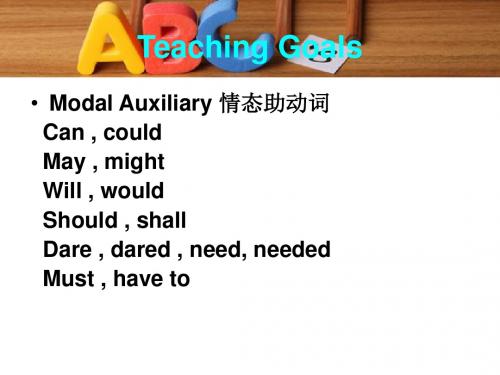高中英语情态动词课件
合集下载
高中英语情态动词ppt课件

Grammar
Suqi1an Sarbrina
2
What’s the definition of modal verbs?
情态动词是一种本身有一定的词义,表 示说话人的情绪,态度或语气的动词,但 不能单独作谓语, 只能和其他动词原形 构成谓语。
3
一.情态动词的语法特征
1) 情态动词 不能单独做谓语,除 ought 和have 外,后面只能接不带to 的 不定式。
19
②. May 和Might
May I watch TV after supper?
禁止,阻止
Yes,_y_o_u_m__a_y__允__许__,_许__可__./ No, __Y__o_u_m__u_s_t_n_’t___________.
Might I use your telephone? Might比May的语气更委婉
12
Could you lend me your dictionary? Could I use your bike? Yes, you can. I’m afraid I couldn’t give you an answer today.
13
can/be able to区别:
can表示与生俱来的能力或一种客观可能,而 be able to更加强调通过后天的学习和努力获 得的能力,或者在某个客观的场合和背景下, 能做到的事情。
6
三.常见情态动词的基本用法
1. can could be able to 2. may might 3. will would 情态动词 4. shall 5. must have to 6. ought to should 7. need dare 8. 情态动词+have done 7
Suqi1an Sarbrina
2
What’s the definition of modal verbs?
情态动词是一种本身有一定的词义,表 示说话人的情绪,态度或语气的动词,但 不能单独作谓语, 只能和其他动词原形 构成谓语。
3
一.情态动词的语法特征
1) 情态动词 不能单独做谓语,除 ought 和have 外,后面只能接不带to 的 不定式。
19
②. May 和Might
May I watch TV after supper?
禁止,阻止
Yes,_y_o_u_m__a_y__允__许__,_许__可__./ No, __Y__o_u_m__u_s_t_n_’t___________.
Might I use your telephone? Might比May的语气更委婉
12
Could you lend me your dictionary? Could I use your bike? Yes, you can. I’m afraid I couldn’t give you an answer today.
13
can/be able to区别:
can表示与生俱来的能力或一种客观可能,而 be able to更加强调通过后天的学习和努力获 得的能力,或者在某个客观的场合和背景下, 能做到的事情。
6
三.常见情态动词的基本用法
1. can could be able to 2. may might 3. will would 情态动词 4. shall 5. must have to 6. ought to should 7. need dare 8. 情态动词+have done 7
情态动词讲解精ppt课件

例句
will/would
详细描述:will 表示现在的意愿或 预测,would 表示过去的或虚拟 的意愿或预测。
1. I will help you with your project.(我会帮助你完成你的项 目。)
总结词:表示意愿或预测
例句
2. They would have gone to the party if they had known about it earlier.(如果他们早点 知道,他们就会去参加聚会。)
表示意愿
情态动词+动词原形,如 would like to go,表示 某人想要去。
形式变化
基本形式
情态动词的基本形式包括 现在时、过去时和将来时 。
过去式
情态动词的过去式通常是 在基本形式后面加-d或ed,如could have done 、should have done等。
将来时
情态动词的将来时通常是 在基本形式后面加-will或shall,如will be able to 、shall have to等。
may与might的区别与联系
总结词
may表示现在的许可或可能性;might表示过去的可能性或许可。
详细描述
may用于肯定句中,表示许可或可能性,例如“You may use this room.”(你可以使用这个房间。 )“The book may be in the library.”(这本书可能在图书馆里。)might表示过去的可能性,常 用于过去时态的句子中,例如“He might come tomorrow.”(他明天可能来。)
未必、很难说
She might not agree with us.
表示虚拟语气
will/would
详细描述:will 表示现在的意愿或 预测,would 表示过去的或虚拟 的意愿或预测。
1. I will help you with your project.(我会帮助你完成你的项 目。)
总结词:表示意愿或预测
例句
2. They would have gone to the party if they had known about it earlier.(如果他们早点 知道,他们就会去参加聚会。)
表示意愿
情态动词+动词原形,如 would like to go,表示 某人想要去。
形式变化
基本形式
情态动词的基本形式包括 现在时、过去时和将来时 。
过去式
情态动词的过去式通常是 在基本形式后面加-d或ed,如could have done 、should have done等。
将来时
情态动词的将来时通常是 在基本形式后面加-will或shall,如will be able to 、shall have to等。
may与might的区别与联系
总结词
may表示现在的许可或可能性;might表示过去的可能性或许可。
详细描述
may用于肯定句中,表示许可或可能性,例如“You may use this room.”(你可以使用这个房间。 )“The book may be in the library.”(这本书可能在图书馆里。)might表示过去的可能性,常 用于过去时态的句子中,例如“He might come tomorrow.”(他明天可能来。)
未必、很难说
She might not agree with us.
表示虚拟语气
(完整版)高中英语语法情态动词公开课课件

I will go to the park with you tomorrow if you will offer me lunch. 情态动词
表示 “意愿”
8.Giving advice (提出意见):
How delicious
!!!
You should not/ought not to
eat so much before running.
A.could C.must
B.can D.would
4.Permission (允许):
May I eat KFC if I win the gold
medal?
may/might:
1. 表示许可。表示请求、允许时, might比may的语气更委婉一些。
— Might/May I use your computer? — Yes, you can.
have been piled up! I don’t have
time……
Don’t worry, dear. I will wash
them right away.
will/would:
1. 表示请求、建议等,would比 will委婉客气。
Would you like sth
sentence pattern
It’s too hot to take exercise in
the afternoon.
Shall we do the training in the morning?
shall: 1.Shall用于第一、第三人称疑问
句中,表示说话人征求对方的意 见、向对方请示或提供帮助 。
1.Shall we begin our lesson?
表示 “意愿”
8.Giving advice (提出意见):
How delicious
!!!
You should not/ought not to
eat so much before running.
A.could C.must
B.can D.would
4.Permission (允许):
May I eat KFC if I win the gold
medal?
may/might:
1. 表示许可。表示请求、允许时, might比may的语气更委婉一些。
— Might/May I use your computer? — Yes, you can.
have been piled up! I don’t have
time……
Don’t worry, dear. I will wash
them right away.
will/would:
1. 表示请求、建议等,would比 will委婉客气。
Would you like sth
sentence pattern
It’s too hot to take exercise in
the afternoon.
Shall we do the training in the morning?
shall: 1.Shall用于第一、第三人称疑问
句中,表示说话人征求对方的意 见、向对方请示或提供帮助 。
1.Shall we begin our lesson?
高一英语英语必修Unit语法情态动词课件

No, you needn’t./you don’t have to. ★mustn‘t 表禁止,不准,一定不要。 You mustn't play with fire. You mustn't take drugs.
The guest may arrive this afternoon. ---Can he attend the meeting?
---Yes, he_m__a_y. I am not sure.
3. 表示祝愿,位于句首 eg. May you succeed! May you have a good journey!
5.must的主要用法
1. 必须。must表主观“必须” have to 表客观“不得不”
I must go home this Saturday. I’ve got a cold, so I have to see a doctor. ---Must I stay here? ---Yes, you must./
• 情态动词的特点: 1.情态动词自身都有一定的意义, 但不能表示正在发生或已经发生的 事情,只表示期待或估计某事发生。 2.情态动词除ought和have外,后 面必须接不带to的不定式。 3.情态动词没有人称和数的变化, 也没有非谓语形式。
1. can和could
1. can的主要用法是: A. 表能力
eg. The girl can dance very well. be able to 通过努力做成某事 He was able to reach Mount Qomolangma in 2000. B. 表示说话者的推测﹑事物的可能性:(否、疑) eg. Can the news be true? C. 在口语中, can可以表示请求或允许:
The guest may arrive this afternoon. ---Can he attend the meeting?
---Yes, he_m__a_y. I am not sure.
3. 表示祝愿,位于句首 eg. May you succeed! May you have a good journey!
5.must的主要用法
1. 必须。must表主观“必须” have to 表客观“不得不”
I must go home this Saturday. I’ve got a cold, so I have to see a doctor. ---Must I stay here? ---Yes, you must./
• 情态动词的特点: 1.情态动词自身都有一定的意义, 但不能表示正在发生或已经发生的 事情,只表示期待或估计某事发生。 2.情态动词除ought和have外,后 面必须接不带to的不定式。 3.情态动词没有人称和数的变化, 也没有非谓语形式。
1. can和could
1. can的主要用法是: A. 表能力
eg. The girl can dance very well. be able to 通过努力做成某事 He was able to reach Mount Qomolangma in 2000. B. 表示说话者的推测﹑事物的可能性:(否、疑) eg. Can the news be true? C. 在口语中, can可以表示请求或允许:
高中英语情态动词精品PPT课件

— Might I watch TV after supper? — Yes, you ________. A. may B. must C. might D. could
.
11
3.表推测,表示主观上的推测,“可能,
也许”,不用于疑问句, might比
may的可能性更小
She may not like this place.
—Yes, he _______. A. need B. must C. may D. will
.
15
2. must表示肯定的推测。 The light is still on, so he must be at home.
Look at his new car. He ______ have a lot of money. A. should B. shall C. may D. must
I can’t believe my eyes. Such well-educated
gentleman ____ behave like this!
A.will B. would C. should D. must
What time ought I _______?
A.arrived
B.arriving
C.arrive
D.to arrive
He _______ speak to his mother like that. A.ought not to B.doesn’t ought to C.not ought to D.ought to not
.
22
1. should= ought to 表示劝告,建议,意 为“应该”, ought to 语气更强些,强调“有责任,有 义务做”
高中英语情态动词 课件(共22张PPT)

A. could have led B. would lead C. should have led D. must lead
【答案】A
情态动词
考点链接
请用合适的情态动词及括号内所给动词的适 当形式填空。
(1)—Tom graduated from college at a very young age.
2. He might have given you more help, but he was busy then.
情态动词
3. He abandoned a career that ______ to his becoming one of the most influential people in the world.
【答案】C
情态动词
1. Since this road is wet and slippery this morning, it _____ last night.
A. Must rain B. was raining C. Must have rained D. may rain 【答案】C
2. I believe he _____ an accident, otherwise he would have arrived on time.
(3)—Need I go with you to the office? (肯定回答)
—____________. 【答案】 Yes,you must
情态动词
(4)—Might I have talk with you this evening?(肯定回答) —____________. 【答案】 Yes,you can/may
A. to report B. to have reported C. to reporting D. have reported 【答案】B
【答案】A
情态动词
考点链接
请用合适的情态动词及括号内所给动词的适 当形式填空。
(1)—Tom graduated from college at a very young age.
2. He might have given you more help, but he was busy then.
情态动词
3. He abandoned a career that ______ to his becoming one of the most influential people in the world.
【答案】C
情态动词
1. Since this road is wet and slippery this morning, it _____ last night.
A. Must rain B. was raining C. Must have rained D. may rain 【答案】C
2. I believe he _____ an accident, otherwise he would have arrived on time.
(3)—Need I go with you to the office? (肯定回答)
—____________. 【答案】 Yes,you must
情态动词
(4)—Might I have talk with you this evening?(肯定回答) —____________. 【答案】 Yes,you can/may
A. to report B. to have reported C. to reporting D. have reported 【答案】B
高考英语情态动词课件(共21张PPT)

He shall get his money.
5)Should 表示说话人的惊奇、愤怒、失望等特殊情感 It’s surprising that Mary should love such a person as Jack. It’s strange that … It’s unthinkable that … I’m sorry that…
肯定疑问 Dare we run? 句
Do we dare (to) run?
否定疑问 Dare he not run? Doesn’t he dare to run ? 句
Need, needed
Need /needed
1、情态动词用于否定句,疑问句 He needn’t worry about it.
This will be the house you're looking for .
Will , would
5)would常用于虚拟条件句,表示与事实相反或不太可能实现的情况 But for your help we would have been late .
6) Would 表示过去的习惯性动作或某人的一典型动作,又使人厌烦的感 觉。 He would go swimming in summer when he was in the countryside.
3.表示请求和允许,与may同义,相当于be allowed to.常用语口语中。 You can smoke in this room. Could I borrow you dictionary?
Can , could
4.用于一些固定句型 a. Cannot ( can never) …too…怎么也不过分
如询问某种可能时,应用can。 He must know my address. (一定) He can’t know my address. (一定不) Can he know my address? (询问可能性)
5)Should 表示说话人的惊奇、愤怒、失望等特殊情感 It’s surprising that Mary should love such a person as Jack. It’s strange that … It’s unthinkable that … I’m sorry that…
肯定疑问 Dare we run? 句
Do we dare (to) run?
否定疑问 Dare he not run? Doesn’t he dare to run ? 句
Need, needed
Need /needed
1、情态动词用于否定句,疑问句 He needn’t worry about it.
This will be the house you're looking for .
Will , would
5)would常用于虚拟条件句,表示与事实相反或不太可能实现的情况 But for your help we would have been late .
6) Would 表示过去的习惯性动作或某人的一典型动作,又使人厌烦的感 觉。 He would go swimming in summer when he was in the countryside.
3.表示请求和允许,与may同义,相当于be allowed to.常用语口语中。 You can smoke in this room. Could I borrow you dictionary?
Can , could
4.用于一些固定句型 a. Cannot ( can never) …too…怎么也不过分
如询问某种可能时,应用can。 He must know my address. (一定) He can’t know my address. (一定不) Can he know my address? (询问可能性)
高中英语-情态动词 课件(共34张PPT)艺体班

• Must的奇葩用法 "偏偏,非得要” • You must play the piano at such a late time? • Why must school begin so early?
四、 shall, should
1) shall 用于第一\三人称疑问句,征求对方的意见。(will用于第 二人称疑问句,征求对方的意见。)
need *否定句及疑问句中;
(sb.) need to do
dare
dare to do
3.常以needn’t 的形式出现;
和daren’t(sth.)
need
to
be
4.dare有其过去时dared.
done
(sth.) need doing
• need 的被动含义:need,want, require, worth (adj.)后面接doing 也可表示被动
• (1)表示许可;
• (2)用于祈使句,表示祝愿,翻译为“祝……”
•
May you succeed!
• (3)把握不太大的推测(只能用在肯定句,不用于疑问句)
•
might不是过去式,它所表示的可能性比may小。
•
1.He may /might be very busy now.
• 固定结构: • 1.may well 有充足的的理由可以-• You may well be proud of him. • 2.may/might as well 还是…为好 • There’s nothing to do, so I may/might/ as well go to bed. • 既然没什么事可做,我还是去睡觉为好. • 3.might as well have done 还不如--(还可用于指过去的
- 1、下载文档前请自行甄别文档内容的完整性,平台不提供额外的编辑、内容补充、找答案等附加服务。
- 2、"仅部分预览"的文档,不可在线预览部分如存在完整性等问题,可反馈申请退款(可完整预览的文档不适用该条件!)。
- 3、如文档侵犯您的权益,请联系客服反馈,我们会尽快为您处理(人工客服工作时间:9:00-18:30)。
D. may be
They are disappointed at the English party. They say that it ___better organized. ( D )
A.had been B. had to be C. must have been D. could have been
2 may / might
1 May I watch Tv after supper? Yes you may /No ,you mustn't.(请求许可) 2 It may be true ./ she may come tomorrow / He might have some fever(推测) 3 May you succeed ! May you have many more days as happy as this one(祝愿)
三 needn't have done would rather have done had better have done
Jenny ____with him at that time, for I was
having dinner with her in my home. ( A
) A.can’t have been B. mustn’t have been C. must be
keep it till next week if you like.
A. can’t B. mustn’t C. needn’t D. may not
8. Johnny, you ___B___ play with the knife, you
______ hurt yourself.
A. won’t ; can’t
• You ought to have helped him with his English, ____you ?
C
• A. won’t you • B. ought not you • C. shouldn’t you • D. wouldn’t you
5 will 与 would 的用法
1 表示意志和意愿 I will never do it again. They said that they would help us.
hospital.( 不得不)
3、表推测语气的反意疑问句的构成
He must be reading,i_s_n_’_t he?
You must do it yourself,d_o_n__’t you?
He must have gone over the article, _h_a_s_n_’t_he?
7 ought to 的 用法
1 表应该与 should 的 区别 You ought to take care of him. You are his father .You ought to get him to receive good education
2 表推测 He ought to be home by now. He must be home by now.
1用于一,三人称疑问句表示征求对方的意见 和 向对方请示 Shall the driver wait ?What shall we do next ?
2 用于 二 三人称陈述句表示命令警告,允诺, 威胁以及法律条文规定 You shall go with me / He shall be punished You shall have the book when I finish it All the children shall go to school at the age of seven.
It must have rained last night,d_id__n_’t_ it?
另外must 还有偏偏一定要的意思 why must you play the piano while others are sleeping.
7. You ___C___ return the book now. You can
B. mustn’t ; may
C. shouldn’t ; must D. can’t ; shouldn’t
9. --Will you stay for lunch?
--Sorry, __B___. My brother is coming to see me.
A. I mustn’t
B. I can’t
C.shall D.may
------When can I come for the photos ? I need them tomorrow afternoon.
-----They __B___be ready by 12 : 00 . (
A. can
B. should
C. might D. need
一 情态动词+ 完成时表对过去的推测 1 must have done(仅用于肯定句) 2 can't /couldn't have done(用于否定疑问句) 3 may have done (肯定,否定均可) 4 might have done(肯定,否定均可)
二 表虚拟 1 should / could /would /might have done
may/ might as well 还是 -----好 we may as well stay where we are
5. — Could I borrow your dictionary? — Yes, of course you ___C____. A. might B. will C. can D. should
C. I needn’t
D. I won’t
10. --May I pick a flower in the garden? -- ____C____.
A. No, you needn’t B. Not, please.
C. No, you mustn’t D. No, you won’t
4 shall 与 should
2 表请求,建议 Will you please take a message for me? Would you please pass him the book?
3 表功能 This machine won't work. 4 表示习惯性动作与used to有何区别 Fish will die without water. Every evening ,he would sit by the window.
quickly but everyone __D____ get out.
A. d to
B. would
C. could
D. was able to
3. They will ___D___ run this machine on
their own in three months.
A. can B. could C. may D. be able to
2 Must I come back before ten ? Yes ,you must. No, you needn't./ don't have to
3 It must be our headteacher. You must be hungry after a long walk.(推测)
4 I really must go now. I have to go now,because my mother is in
succeeded in doing sth.。
1. A computer ___A___ think for itself; it
must be told what to do.
A. can’t
B. couldn’t
C. may not
D. might not
2. The fire spread through the hotel very
He daren’t speak English before such a crowd, dare he?
She _____out alone at night. ( C)
A.dare not to go B. dares not go C. doesn’t dare to go D. doesn’t dares go
---- Did you walked home by yourself last night ?
---- Yes, I did. But I think I _____. ( D)
A. needn’t
B. shouldn’t
1 can / could / be able to
1 Some of us can use computers now, but we couldn't last year.(能力) 2 It will be sunny in the day time ,but it can rain later on this evening(客观可能性) 3 ---Can I go now ? yes ,you can (请求和允许) 4 Could you wait a few days for the memory? (请求) 5 1 Can this news be true?
6 表竟然 I don't know why you should be so rude to your mother
Tom’s father promised, “You _C__have a
new computer if you pass the coming examination,”
They are disappointed at the English party. They say that it ___better organized. ( D )
A.had been B. had to be C. must have been D. could have been
2 may / might
1 May I watch Tv after supper? Yes you may /No ,you mustn't.(请求许可) 2 It may be true ./ she may come tomorrow / He might have some fever(推测) 3 May you succeed ! May you have many more days as happy as this one(祝愿)
三 needn't have done would rather have done had better have done
Jenny ____with him at that time, for I was
having dinner with her in my home. ( A
) A.can’t have been B. mustn’t have been C. must be
keep it till next week if you like.
A. can’t B. mustn’t C. needn’t D. may not
8. Johnny, you ___B___ play with the knife, you
______ hurt yourself.
A. won’t ; can’t
• You ought to have helped him with his English, ____you ?
C
• A. won’t you • B. ought not you • C. shouldn’t you • D. wouldn’t you
5 will 与 would 的用法
1 表示意志和意愿 I will never do it again. They said that they would help us.
hospital.( 不得不)
3、表推测语气的反意疑问句的构成
He must be reading,i_s_n_’_t he?
You must do it yourself,d_o_n__’t you?
He must have gone over the article, _h_a_s_n_’t_he?
7 ought to 的 用法
1 表应该与 should 的 区别 You ought to take care of him. You are his father .You ought to get him to receive good education
2 表推测 He ought to be home by now. He must be home by now.
1用于一,三人称疑问句表示征求对方的意见 和 向对方请示 Shall the driver wait ?What shall we do next ?
2 用于 二 三人称陈述句表示命令警告,允诺, 威胁以及法律条文规定 You shall go with me / He shall be punished You shall have the book when I finish it All the children shall go to school at the age of seven.
It must have rained last night,d_id__n_’t_ it?
另外must 还有偏偏一定要的意思 why must you play the piano while others are sleeping.
7. You ___C___ return the book now. You can
B. mustn’t ; may
C. shouldn’t ; must D. can’t ; shouldn’t
9. --Will you stay for lunch?
--Sorry, __B___. My brother is coming to see me.
A. I mustn’t
B. I can’t
C.shall D.may
------When can I come for the photos ? I need them tomorrow afternoon.
-----They __B___be ready by 12 : 00 . (
A. can
B. should
C. might D. need
一 情态动词+ 完成时表对过去的推测 1 must have done(仅用于肯定句) 2 can't /couldn't have done(用于否定疑问句) 3 may have done (肯定,否定均可) 4 might have done(肯定,否定均可)
二 表虚拟 1 should / could /would /might have done
may/ might as well 还是 -----好 we may as well stay where we are
5. — Could I borrow your dictionary? — Yes, of course you ___C____. A. might B. will C. can D. should
C. I needn’t
D. I won’t
10. --May I pick a flower in the garden? -- ____C____.
A. No, you needn’t B. Not, please.
C. No, you mustn’t D. No, you won’t
4 shall 与 should
2 表请求,建议 Will you please take a message for me? Would you please pass him the book?
3 表功能 This machine won't work. 4 表示习惯性动作与used to有何区别 Fish will die without water. Every evening ,he would sit by the window.
quickly but everyone __D____ get out.
A. d to
B. would
C. could
D. was able to
3. They will ___D___ run this machine on
their own in three months.
A. can B. could C. may D. be able to
2 Must I come back before ten ? Yes ,you must. No, you needn't./ don't have to
3 It must be our headteacher. You must be hungry after a long walk.(推测)
4 I really must go now. I have to go now,because my mother is in
succeeded in doing sth.。
1. A computer ___A___ think for itself; it
must be told what to do.
A. can’t
B. couldn’t
C. may not
D. might not
2. The fire spread through the hotel very
He daren’t speak English before such a crowd, dare he?
She _____out alone at night. ( C)
A.dare not to go B. dares not go C. doesn’t dare to go D. doesn’t dares go
---- Did you walked home by yourself last night ?
---- Yes, I did. But I think I _____. ( D)
A. needn’t
B. shouldn’t
1 can / could / be able to
1 Some of us can use computers now, but we couldn't last year.(能力) 2 It will be sunny in the day time ,but it can rain later on this evening(客观可能性) 3 ---Can I go now ? yes ,you can (请求和允许) 4 Could you wait a few days for the memory? (请求) 5 1 Can this news be true?
6 表竟然 I don't know why you should be so rude to your mother
Tom’s father promised, “You _C__have a
new computer if you pass the coming examination,”
